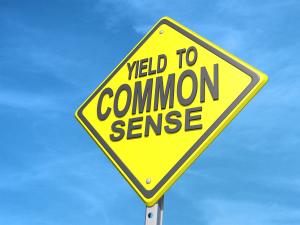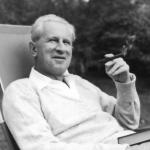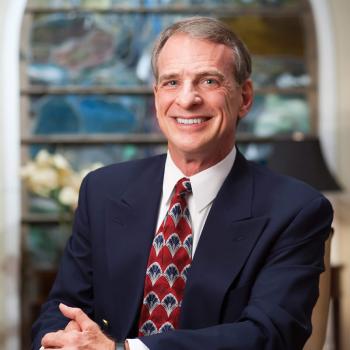Recently Jordan Peterson interviewed Catholic philosopher Peter Kreeft. Kreeft is one of the wisest voices in American intellectual culture today. In the interview, when asked about a common theme that runs through his many books, Kreeft spoke about the intersection of abstract and theoretical thought (3.20-4.10) with that of common sense. Referencing Chesterton’s book on St. Thomas Aquinas, Kreeft mentions Chesterton’s insight into how Aquinas’ brilliance in abstract, metaphysical thinking never overshadowed or conflicted with Aquinas’ practical sense about the world and his living in it.
Aquinas (like Kreeft and Peterson) was a “great champion” of common sense. His contemplation and articulation of the eternal and the universal, which often comes only through great intellectual effort, did not interfere with the straightforward, basic knowledge of the world he possessed. This knowledge, of course, arising in virtue of the natural senses and practical reason God provided him (and all of us). Of course, this idea is both a very biblical and Aristotelian approach to reality–Aquinas being the great synthesizer of the two. As such, theory reinforces common sense, it never undoes it.
Unfortunately, as the old saying goes, “common sense is not that common.” Moreover, this lack of common sense is something we are experiencing in extremis in America today. Thus, we are in desperate need of correcting our current course. A return to common sense will avail much in a culture that has succumbed to the sense-less, the non-sensical and even the counter-sensical. But, what is the enemy of common sense that has so seduced our culture?
Living in A Theoretical World
One of the biggest errors we face today, an error men like Peterson and Kreeft are trying to correct for, is our incredible loss of basic common sense. Instead of trusting our most natural intuitions about the world, the kind of common sense wisdom previously passed on to us through venerable traditions, we now live in a culture dominated by “theory.” What I mean by theory here is fairly broad. It is not narrow in the sense of a particular scientific theory in an even more particular field of science (e.g., “germ theory”). Theory in this sense is something like a mental model of the world, usually one spawned by an individual thinker, that stands in contrast to the corporate and historical “received wisdom” of the past (which is often very ancient and religious in nature).
While theory has been with us for some time, a new kind of theory emerged in the days of David Hume and Immanuel Kant. We could call this a kind of critical theory, in that it launched an era of skepticism about the received wisdom of the past. However, this kind of theory tended to remain in the upper echelons of society, among the social and intellectual “elite” for several hundred years. Clearly, however, this is no longer the case. With global modernization, mobilization and communication, theory has now become reality (metaphorically speaking), and Western culture is in the throes of what we might call “theory wars.”
In his seminal book, A Secular Age, Charles Taylor painstakingly lays out the history of this “diffusion” of academic theory into popular culture:
Now we might be tempted to think that the spiritual condition of the élite became that of the masses largely through diffusion. This was aided by the expansion of standard education, the spread of literacy, and then the higher levels of schooling, and more recently through the great growth in university training. The élite condition often became generalized too, by the fact that modern society inducts everyone into the same mode of life, tends to wipe out the distinction between town and country, and inculcates in everyone the same social imaginary, relating to the society as a whole, particularly with the penetration everywhere of electronic media.
A Secular Age, 424
Taylor goes on to paint a more complex historical picture than a simple, linear “intellectual” diffusion from the elite to the masses. However, as he points out, with the emergence of “electronic media” over the course of the 20th century, this diffusion of the theoretical is far greater than ever before. Now with the advent of social media in the last 20 years, it is inescapable.
As such, the temptation to deny common sense seems to increase commensurate to the amount of theory presented to us daily by an omnipresent media. A recent documentary, What is A Woman?, created and moderated by cultural commentator Matt Walsh, highlights the glaring contrast between a culture living in this highly techno-centric, “theoretical” mode (American culture) versus one living in the mode of common sense (the Maasai culture of rural Kenya). The simple questions Walsh poses to various professors, educators and therapists in America: “What is a woman?” and “Can a woman become a man?” are met with long-winded, convoluted, incoherent and emotional-charged answers. Yet when the same questions are presented to the Maasai tribesmen, the common sense answers we all know to be true are given.
Two-Level Theories And The Loss of Common Sense
In the 19th century, in the aftermath of Kant’s critique of metaphysical knowledge, various theories emerged to fill the vacuum left by the supposed deconstruction of religious claims and classical wisdom. If Christianity and the Church could not explain, or had lost the authority to attempt to explain, the underlying workings of man and his world, then it would be up to the philosophers and artists to figure out what alternatives might exist and how they could be applied to concrete existence.
These “two-level” theories, as philosopher Daniel Bonevac calls them, sought to uncover the mysterious substrate of reality. If this substrate could be identified and properly grasped, the resulting knowledge would allow mankind to manipulate and shape the “manifest image” of reality we normally experience through the senses. Bonevac rightly calls this 19th century approach to knowledge a kind of “neo-Gnosticism.” Thinkers like Marx, Schopenhauer and Freud sought a kind of “special knowledge” that could unlock the secrets to mankind’s place in the world, the forces that drive him to action and ultimately determine the cultures he will build.
For Marx it was economic forces that underlie all social reality, to include religious belief. If one could discover the underlying laws of economics: of how to produce material goods, distribute them equally, as well as be in proper relationship with one’s own labor, only then could the possibility of a classless, utopian society emerge. For Schopenhauer, alternatively, the underlying substratum of reality consisted in the struggle of individual energy, the subjective will of man, against the cold, soulless and “wicked” forces of nature. Freud, of course, saw the libidinal drives of man (the “Id”) as the subconscious motivator of all social reality–in both its generative form (the life principle, or Eros) and its destructive form (the death principle, Thanatos).
These monumental “two-level” theories of the 19th century set the fuse for what would be an explosion of neo-gnostic, critical theories in more recent times.
The Rise and Dominance of Critical Theory
In the 20th century, it was the Frankfurt School philosophers like Max Horkheimer, Theodor Adorno, Herbert Marcuse and Franz Neumann that integrated “theory” and culture. Developing 19th century theories, especially those of Marx and Freud, these critical theorists sought to analyze every particular, social phenomena in light of their theoretical models. Even the most influential French philosopher of critical theory (and renown amoralist) Michel Foucault, paid homage to the Frankfurt School:
Michel Foucault, one of the most important of the post-structuralists, said: ‘If I had known about the Frankfurt School in time, I would have been saved a great deal of work. I would not have said a certain amount of nonsense and would not have taken so many false trails trying not to get lost, when the Frankfurt School had already cleared the way.’
Rolf Wiggershaus, The Frankfurt School, 4
It was Theodor Adorno’s painstaking approach to social phenomena that best exemplifies this over application of theory to the concrete. In his Minima Moralia, Adorno commits to a view of social phenomena that sees every aspect of human life, no matter how small, as a confirmation of social theory (his own social theory, of course). Matthias Benzer highlights Adorno’s taxing approach to social life:
This is why Adorno thinks that in the ‘detail oftentimes something decisive about the universal comes up’. Since every ‘individual phenomenon contains in itself the entire society’ (PD 39–40), sociology can make even the putatively most trifling situations and phenomena relevant for examining the social whole.
Excerpt From: Matthias Benzer. “The Sociology of Theodor Adorno.” Apple Books.
This typical German approach of reading into every human interaction some underlying aspect of one’s theory, usually some form of Marxist theory, now dominates American culture. Moreover, in its dominance, the constant theorizing tends to drive us literally insane, as every mundane, human interaction is interpreted in light of some convoluted theory as opposed to simple common sense.
Even more unfortunate is the fact that since the mid 20th century this view of social reality has not only permeated through culture, greatly impacting the common sense of an entire nation, but it has further devolved in its intellectual acumen. One could at least say of men like Horkheimer or Adorno, as terribly flawed as their theories were, that they were at least well-educated minds. Today, one could hardly apply that attribution to contemporary critical theorists.
In addition, contemporary critical theories now abound, each one more specified than the next: race, gender, disability, queer, etc. In their ever-increasing narrowness, these new manifestations of Critical Theory act as incredibly inaccurate “two-level” theories. After all, the broader the theory, the more things you may actually get right. However, contemporary critical theories have analytical edges so blunt that any analysis of social life they make is akin to doing surgery with a butter knife.
However unfortunate this all may be, the fact remains that the social world we live in is now a critical theory world (and actually has been for some time). Of course, this is not at the level of the actual substratum (which is and always has been a spiritual one), but it is at the superficial level of social engagement and communication.
Why We Hate Common Sense
There is an explanation though as to why human beings would prefer theories as opposed to common sense. Theory can allow us to play around with the given of our senses, to deemphasize those aspects of reality we don’t like and exaggerate the ones we do. Theory can offer us a temporary escape route from the actual design of God’s world. It allows us to act as creators of our own subjective cosmoi, rather than inhabitants of God’s cosmos. We have been given the intellectual ability to do just this, to look at the world with abject skepticism, or despair, and come up with some other explanation for the way things really are.
In addition, there are pragmatic benefits to theory building. As Thomas Sowell so keenly points out, no scholar or member of the intellectual “elite” makes his bones or his reputation off of pointing out the obvious. Novelty, regardless of accuracy or correspondence to truth, is always the great temptation of the academic.
Of course, there is a place for theoretical thought. It is most appropriate, and most fruitful, when approaching the world with a sense of awe and wonder in light of its Creator. This is the approach that led to the rise of modern science itself, especially in the Christian West. The intelligent and intelligible design of the Universe and the reliable, moral nature of its Creator provided the seedbed for all innovations of modern science, medicine and technology.
Yet, in our hatred of common sense and our desire to escape from reality (to paraphrase Francis Schaeffer), we in America have now chosen (for decades) to create fantasy worlds in which we hope to live. The generative mechanism of those worlds is our entertainment industry, mainly Hollywood, and the enforcement of them our politics, especially the politics of the Left.

20 Common Sense Truths That People Hate
As such, I find it necessary to simply restate some basic facts of common sense. These are truths that are apparent to any human intellect, so long as that intellect has not been too corrupted by theory. They are apparent to “the natural light of reason” that the American founders knew to be the case. This was before common sense was forfeited to the 19th century and 20th century “two-level” theories that migrated into the English speaking world primarily via Germany and France.
Here are twenty common sense truths that people who love theory will hate to admit:
- There is an external world.
- You are not the center of that world.
- Human beings did not create the world (which means neither did you create the world).
- Human beings are unique from all other animals in the world.
- Being unique, human beings warrant special dignity and treatment.
- All human beings have this dignity, regardless of size, level of development, environment or degree of dependence (see Klusendorf, SLED).
- Since human beings are not like other kinds of animals, they cannot become other kinds of animals (e.g., dogs, cats, hermit crabs, whatever).
- There are men and there are women. There is no third sex.
- A man cannot become a woman, nor a woman a man (see the president’s recent statements about the draft as more “common sense” evidence of this). But, a man can pretend to be a woman and vice-versa. But this is what we call “pretending,” it isn’t real. I can pretend to be Tom Brady at Halloween. This doesn’t mean I can throw a football, have multiple NFL Super Bowl rings or was once married to Gisele Bundchen. Moreover, even if I did have those things, or was once married to Gisele, I still would not be Tom Brady.
- Human beings cannot become fictional creatures, e.g., you cannot become a dragon. You can dress up as one though, just like you can dress up as Tom Brady.
- The arrow of time moves in forward succession; backward causation is impossible; and there is no such thing as an actual infinite (this one is for the metaphysically minded, let’s keep it real, eh?).
- Words can hurt, but they cannot make you non-existent. This means nothing I write here, no matter how much you dislike it, will cause you to stop existing (see points 7-10).
- All human beings, regardless of race, sex, class, ability or any other social or biological feature, are equally capable of being evil (even if they are not always equal in their ability to commit evil acts).
- Human knowledge is, and always will be, finite.
- Sexual intercourse (as pleasurable as it may be) outside marriage always damages people, both the parties involved and the society in which they live.
- Men and women are not identical– they are different. There are some things men can do (or do better) that women cannot do (or not do as well), and there are some things that women can do (or do better) that men cannot do (or not do as well). Sports is one of those things.
- Logic and mathematics are universally applicable (regardless of time and culture).
- People who work should be privileged over those who have the same capacity to work, yet choose not to.
- Courage is the rarest of the virtues, followed closely by humility.
- Human beings are not born inherently good or neutral. Virtue will always be hard to attain, vice always easy to enact.
One Final Thought About Common Sense
One final word about these 20 common sense truths: they all presuppose that there is something objectively true, which is itself a theoretical question: “is there objective truth?” I will end, therefore, with a quote from philosopher Peter van Inwagen that echoes my own sentiments about that theoretical question:
The most interesting thing about objective truth is that there are people who deny that it exists. One might wonder how anyone could deny that there is such a thing as objective truth. At least I might. In fact, I often have. For some people, I am fairly sure, the explanation is something like this. They are deeply hostile to the thought of anything that in any sense stand in judgement over them. The idea toward which they are most hostile is, of course, the idea of there being a God. But they are almost as hostile to the idea of there being an objective universe that doesn’t care what they think and could make their most cherished beliefs false without even consulting them….Let the reader be warned. It must be evident that I am unable to enter into the smallest degree of imaginative sympathy with those who deny that there is such a thing as objective truth….I should prefer to think that no one actually believes what, on the surface at least, it very much looks as if some people believe.
van Inwagen, Metaphysics, 4th Edition, 110
I will even take it one step further than van Inwagen. The abandonment of common sense is exactly because of our deep-seated desire to not have anything, not even an impersonal universe, be in the position of judging over us, over our actions or our beliefs. And so to avoid this, we reject common sense in favor of the fancy of theory, yet in doing so we confirm not theory, but the biblical revelation itself:
18 For the wrath of God is revealed from heaven against all ungodliness and wickedness of men who by their wickedness suppress the truth. 19 For what can be known about God is plain to them, because God has shown it to them. 20 Ever since the creation of the world his invisible nature, namely, his eternal power and deity, has been clearly perceived in the things that have been made. So they are without excuse; 21 for although they knew God they did not honor him as God or give thanks to him, but they became futile in their thinking and their senseless minds were darkened. 22 Claiming to be wise, they became fools, 23 and exchanged the glory of the immortal God for images resembling mortal man or birds or animals or reptiles.
24 Therefore God gave them up in the lusts of their hearts to impurity, to the dishonoring of their bodies among themselves, 25 because they exchanged the truth about God for a lie and worshiped and served the creature rather than the Creator, who is blessed for ever! Amen.
26 For this reason God gave them up to dishonorable passions. Their women exchanged natural relations for unnatural, 27 and the men likewise gave up natural relations with women and were consumed with passion for one another, men committing shameless acts with men and receiving in their own persons the due penalty for their error.
28 And since they did not see fit to acknowledge God, God gave them up to a base mind and to improper conduct. 29 They were filled with all manner of wickedness, evil, covetousness, malice. Full of envy, murder, strife, deceit, malignity, they are gossips, 30 slanderers, haters of God, insolent, haughty, boastful, inventors of evil, disobedient to parents, 31 foolish, faithless, heartless, ruthless. 32 Though they know God’s decree that those who do such things deserve to die, they not only do them but approve those who practice them.
Romans 1:18-32 (RSV)


















